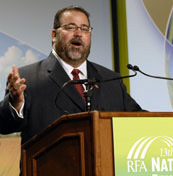 President George W. Bush announced today his initiative to curb greenhouse growth in the United States. And according to this White House press release, ethanol and biodiesel are part of the plan:
President George W. Bush announced today his initiative to curb greenhouse growth in the United States. And according to this White House press release, ethanol and biodiesel are part of the plan:
[T]he United States has launched — and the G8 has embraced — a new process that brings together the countries responsible for most of the world’s emissions. We’re working toward a climate agreement that includes the meaningful participation of every major economy — and gives none a free ride.
In support of this process, and based on technology advances and strong new policy, it is now time for the U.S. to look beyond 2012 and to take the next step. We’ve shown that we can slow emissions growth. Today, I’m announcing a new national goal: to stop the growth of U.S. greenhouse gas emissions by 2025.
To reach this goal, we will pursue an economy-wide strategy that builds on the solid foundation that we have in place. As part of this strategy, we worked with Congress to pass energy legislation that specifies a new fuel economy standard of 35 miles per gallon by 2020, and requires fuel producers to supply at least 36 billion gallons of renewable fuel by 2022. This should provide an incentive for shifting to a new generation of fuels like cellulosic ethanol that will reduce concerns about food prices and the environment.
Bush added that in partnership with the private sector, the United States has invested billions of dollars in research and development for commercially viable renewable fuels, hydrogen fuel cells, advanced batteries, and other technologies for the next generation of renewable energy-powered vehicles. He says new incentives will be needed to sustain that growth in renewable energy technologies in order to meet that goal of stopping the growth of U.S. greenhouse gas emissions by 2025.


 Rising food prices continue to make headlines and all too often the blame is placed on the use of corn for ethanol.
Rising food prices continue to make headlines and all too often the blame is placed on the use of corn for ethanol. The food vs. fuel debate is still going strong with the chief executive officer of a major biofuel producer telling a technology summit not to blame his industry for the rise in food prices.
The food vs. fuel debate is still going strong with the chief executive officer of a major biofuel producer telling a technology summit not to blame his industry for the rise in food prices. No, I’m not talking about something for St. Patrick’s Day. A brewer in Hawaii is making beer using green methods… including using biodiesel in the process.
No, I’m not talking about something for St. Patrick’s Day. A brewer in Hawaii is making beer using green methods… including using biodiesel in the process.
 Auburn University, already helping Gadsden, Hoover, Montgomery, and Daphne, Alabama run their cities greener, is offering its help to another city wanting to reduce its dependency on oil.
Auburn University, already helping Gadsden, Hoover, Montgomery, and Daphne, Alabama run their cities greener, is offering its help to another city wanting to reduce its dependency on oil. A team of high school students is one of the top finishers in a college-level energy competition for its biodiesel project.
A team of high school students is one of the top finishers in a college-level energy competition for its biodiesel project.
 In a speech to the International Oil Summit in Paris, Minister Ali bin Ibrahim
In a speech to the International Oil Summit in Paris, Minister Ali bin Ibrahim  Not surprisingly,
Not surprisingly,